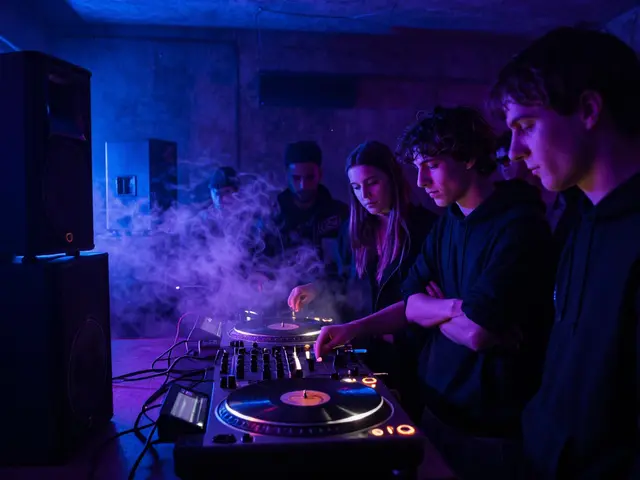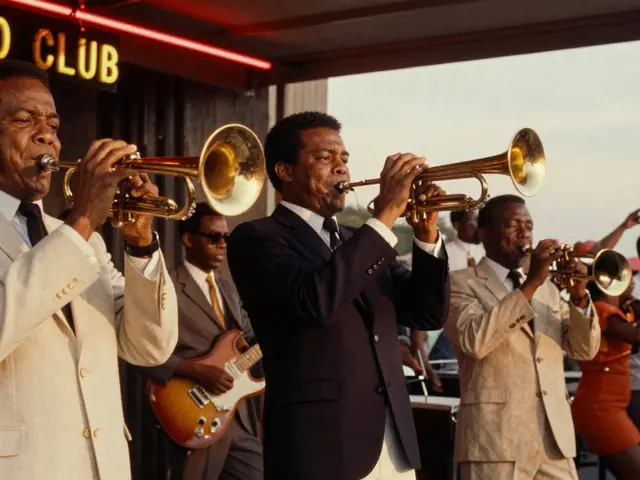Music has long been an integral part of human culture, weaving its way into our daily lives and emotions. It's fascinating how a melody can instantly transport us to a distant memory or shift our mood entirely. But what causes this intense connection? The answer lies in the intricate relationship between music genres and psychology.
Across the world, each genre of music carries a unique emotional signature, from the energetic beats of pop to the soothing harmonies of classical. These genres do more than entertain; they resonate with our innermost feelings and reflect our true selves. By understanding the psychological aspects of music, we can unlock new ways to connect with ourselves and those around us.
In this exploration, we will uncover how different music genres trigger varied emotional responses, influenced by cultural backgrounds, societal norms, and personal experiences. Whether you're a fan of rock's rebellious spirit or classical's calming presence, there's a psychology behind why you're drawn to each sound.
- The Emotional Impact of Music
- Cultural and Societal Influences on Genre Preference
- Personality Traits and Music Choices
- The Neuroscience of Listening Experiences
- Tips to Enhance Your Musical Journey
The Emotional Impact of Music
Music has the exceptional power to evoke a wide range of emotions, from joy to sorrow, excitement to relaxation. Its influence on human emotions is profound, often acting as a catalyst for emotional processing and expression. This impact is incredibly diverse across different music genres, each bringing forward its unique emotional palette. Pop music, with its catchy rhythms and upbeat melodies, often induces happiness and energizes listeners, making it a staple on party playlists. On the opposite spectrum, the soulful strains of blues music can stir feelings of melancholy and introspection, touching on themes of heartache and loss. This is not just coincidental but a testament to the intricate human relationship with sound.
Emotions elicited by music are not limited to individual experiences; they can also unite communities. For instance, the swelling choruses of anthems can evoke pride and camaraderie during national or sports events, demonstrating music's ability to bring together groups under a shared emotional experience. Such experiences are not merely superficial responses but are deeply embedded in our neurological pathways. Research has shown that the brain releases dopamine, a chemical associated with pleasure and reward, when a person listens to their favorite songs, suggesting that our enjoyment of music is seated in the very structure of our neuronal circuits.
"Music is a world within itself, with a language we all understand," Stevie Wonder famously said, capturing the universal nature of musical emotions. This quote highlights music as a universal language that transcends cultural and linguistic barriers, enabling it to communicate emotions in ways words sometimes cannot. The ability of music to tap into our emotional reservoirs is why it features prominently in films and advertisements, setting the tone and evoking specific reactions from audiences. For instance, thrillers often use intense, low bass notes to build suspense and anxiety, amplifying the viewing experience through emotional manipulation.
Genres like classical and jazz offer a more nuanced emotional experience, often acting as a backdrop for relaxation and contemplation. The complexity of these genres allows the listener's mind to wander, often facilitating creativity and problem-solving. While different people may respond variably to genres, personal preference plays a significant role in how music impacts mood and emotion. This personal connection to music is deeply tied to one's upbringing, cultural background, and even personality traits, making each experience with music unique and personal.
The relationship between emotions and music is also observed in therapeutic settings, where music therapy is used to help individuals process and heal from emotional trauma. The therapeutic potential of music underscores its capacity to influence mood, reduce stress, and enhance overall well-being. Understanding these emotional connections opens up possibilities for using music deliberately as a tool for emotional regulation and enhancement of mental health.
Cultural and Societal Influences on Genre Preference
The way we perceive and appreciate music is deeply intertwined with our cultural and societal backgrounds. From the lively samba rhythms of Brazil to the solemn chants of Native American tribes, every culture has its unique soundscape that reflects its history, values, and traditions. These diverse musical expressions shape not only individual preferences but also collective identities.
Consider how cultural heritage plays a pivotal role in shaping our music psychology. For example, individuals who grow up in regions with a rich tradition of folk music may find themselves naturally inclined towards acoustic sounds and storytelling lyrics. This cultural exposure starts at a young age, often embedded within family settings and community gatherings, providing a soundtrack to life events and celebrations.
Societal changes also influence music preferences. The rise of the internet and social media has blurred geographic boundaries, allowing people to experience global music trends. This digital era has made it possible for K-pop, a genre heavily influenced by Korean culture, to become a worldwide phenomenon, demonstrating that societal influences can transcend borders.
"Music is the universal language of mankind." - Henry Wadsworth LongfellowThe inclusivity of music makes it a powerful tool for societal change. Various music movements throughout history have been at the forefront of social and political change. Consider the role of protest songs during the Civil Rights Movement in the United States. These songs became anthems for change, reflecting the societal atmosphere and influencing a generation.
Additionally, music genres often evolve with societal trends. The swinging jazz of the 1920s mirrored the era's desire for liberation and innovation, just as hip-hop in the late 20th century voiced the trials of urban life. This dynamic interaction between music and society shapes how genres exist and evolve, affecting how music is consumed across different demographics.
It's fascinating to observe how music, a seemingly intangible art form, reflects tangible aspects of society. As cultures continue to interconnect, our understanding of emotional connection through music will evolve. Despite this evolution, the foundational role of cultural and societal influences in shaping musical tastes remains unshakeable. Through these melodies, we find echoes of our history, articulations of our present, and visions for the future.

Personality Traits and Music Choices
Music preferences are not just a matter of taste; they provide insights into our personalities. Studies have shown that the type of music we gravitate toward can be linked to specific personality traits. For example, people who enjoy classical music tend to have open personalities, appreciating the complex structures and emotional depth that this genre offers. On the other hand, fans of energetic genres like pop or dance music are often extroverted and enjoy social activities where they can express themselves freely. This connection between personality and music preference underscores how important music is as a form of personal expression, shedding light on who we are beneath the surface.
One study, led by researchers at Heriot-Watt University, surveyed over 36,000 participants across the globe. They found consistent patterns between music genre preferences and personality traits. For instance, those who enjoy listening to jazz tend to be creative and comfortable with taking the spotlight, displaying confidence in themselves. Similarly, rock and heavy metal aficionados are surprisingly gentle at heart and often have high self-esteem, contrary to the aggressive nature of the music they enjoy. This study sheds light on the subtle but powerful ways music aligns with our internal character.
"Music gives a soul to the universe, wings to the mind, flight to the imagination and life to everything," Plato once said, emphasizing the profound impact music has on the human experience.
Delving deeper, people with a preference for rap and hip-hop often exhibit high self-esteem and are outgoing, enjoying the energy and lyrical boldness of these genres. These genres reflect cultural storytelling and assertiveness, attracting those who find empowerment in words. Meanwhile, country music fans often possess traits like honesty and stability, preferring narratives of everyday life and emotional straightforwardness. An intriguing aspect of these findings is how our music choices withstand cultural and societal differences, pointing to a universal language in musical expression.
The influence of music on personality is not a one-way street. Our personality can shape the kind of music we are drawn to, but music also has the power to influence and even alter our thoughts and behaviors. Listening to different genres can serve as a tool for emotional management, allowing people to adapt and react according to various situations in life. For example, someone might listen to soothing tunes during times of stress to calm their mind or pump up with rock beats before a big meeting to boost their confidence. With this knowledge, individuals can harness the power of music to enhance personal growth and emotional well-being.
Understanding these connections helps us appreciate the power of music as more than just an art form or a source of entertainment. It's a gateway to self-discovery and a reflection of the diverse tapestry of human personality. When we share our favorite playlists with others, we are not just sharing sounds but a piece of our identity, inviting others to understand us on a deeper level. This shared experience can forge stronger social bonds and build empathy among people with different tastes, showing how music, in its various forms, can unite us all. So next time you hit play on your favorite track, remember there's much more than just melody at work; there's a conversation happening between your music and your soul.
The Neuroscience of Listening Experiences
Music is a universal language, and our brains are incredibly attuned to its rhythms and melodies. When we listen to our favorite song, a symphony of neural networks activates, illustrating a remarkable interaction between music and the brain. The neuroscience behind music isn't just an academic curiosity; it’s an exploration of how deeply music is wired into who we are. Research shows that music stimulates multiple areas of the brain, including those responsible for emotion, memory, and even our body's movement coordination. Each beat of the drum, note of the piano, or strum of the guitar can evoke vivid emotional reactions, influencing everything from our mood to our energy levels.
The brain processes music through structures like the auditory cortex, which interprets tone and pitch, and the limbic system, which is heavily involved in the emotions music stirs. Why does an upbeat pop song make you feel energized, while a classical symphony may induce restfulness? The secret lies in the dopamine release triggered by these sounds, a neurotransmitter known as the pleasure chemical, offering the same satisfaction one might derive from a good meal or exercise. Neuroscientists have found that just anticipating a musical peak can increase dopamine, altering one’s emotional state even before the music reaches its zenith.
A study conducted by McGill University researchers corroborates these findings, emphasizing the substantial impact of music on mood regulation. They discovered that distinct genres might affect the brain in different ways. For instance, fast tempos in music genres like pop or rock can elevate heart rates and energize listeners, while slower rhythms, typical of classical or jazz, can help calm one's nerves. As an insightful note from the study captures,
"Music, through its rhythm and tone, connects with us on a neurologically fundamental level, encompassing our thoughts and emotions in a single embrace."
From an evolutionary perspective, our ancestors relied on auditory cues for survival, and music might have served as a social tool to strengthen community bonds. Today, it continues to play a similar role in personal and societal well-being. But what does this mean for someone choosing their go-to music genre? It means understanding that these choices are not just mere preferences A good example is how many athletes curate playlists of energizing tracks to boost their performance, harnessing the brain’s response to rhythm. This knowledge can be powerful, suggesting ways anyone can consciously use music in their lives to improve mood, boost productivity, or even relax after a long day.
Moreover, brain imaging studies reveal that musicians may process music differently than non-musicians, with a more significant activation in areas linked to emotional processing and memory. So, whether someone's heart beats for pop or they find solace in classical serenades, these musical genes are locked not only in our culture but also in our neurobiology. It's a dance of brain waves and notes, composing a unique cognitive choreography. As we delve deeper into the **music psychology**, it’s this intricate relationship between brain, body, and harmony that continues to intrigue scientists and music lovers alike.

Tips to Enhance Your Musical Journey
Embarking on your musical journey is among the most personal and rewarding paths one can take. It can be a reflective quest to deepen your connection with music and understand how different music genres affect your emotional world. Start by exploring new kinds of music that you haven't ventured into before. Too often, we stick to what we know and miss out on styles that might surprise us with their emotional depth. Try to listen with an open mind, whether it's jazz, folk, or electronic. Each genre offers a different perspective on the human experience, celebrating different facets of joy, sorrow, excitement, or relaxation.
Another great way to enhance your musical journey is to engage actively with the music. Attend live performances whenever possible, as the energy of a live setting can amplify the emotions conveyed by the music. Try not just listening passively; invest yourself in understanding the lyrics, the instruments, or the cultural context behind a piece. You might find that understanding the stories or histories behind songs and genres can transform your listening experience. As you delve deeper, consider learning more about the artists and influences that shaped the sounds you love. Knowing who dabbled in musical revolutions or who quietly pushed boundaries can create a more profound appreciation of the artistry involved.
Many people find that playing an instrument enriches their musical journey significantly. Even if you're not looking to perform on stage, consider picking up an instrument like the guitar or piano. Familiarizing yourself with basic music theory can also demystify the way songs are constructed, offering a new level of awe at the technical skill behind the scenes. If you’re feeling ambitious, write a song of your own or participate in a music workshop. The act of creation can often lead to a deeper connection and understanding of the art form. Also, consider journaling about your musical experiences and discoveries. Writing about what you feel as you engage with a song or a sound can deepen your introspection and emotional understanding.
"Music expresses that which cannot be put into words and that which cannot remain silent," Victor Hugo once remarked, capturing the ineffable power of music in our lives.
Remember to integrate music into your daily life more deliberately. Craft a soundtrack for your day—wake up to stimulating sounds, take a mid-afternoon calming break with soothing tunes, or wind down with reflective melodies in the evening. Your choice of soundtracks can significantly impact your mindfulness and emotional regulation throughout the day. Additionally, explore music's therapeutic potential. Many studies have supported music psychology as a tool for reducing stress and enhancing mood. Embrace the healing aspect of music by creating playlists that serve specific mental or emotional needs. Consider using platforms that offer curated suggestions based on your mood or activities to discover new pieces that fit your inner world.






